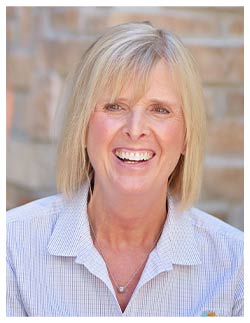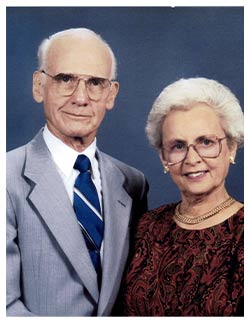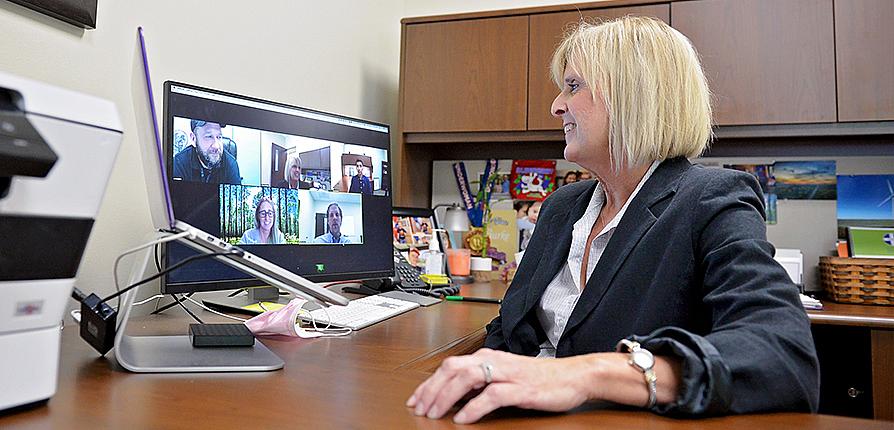CEO leads Burke Center through pandemic
Story by Jo Gilmore
Photos by Robin Johnson '99 & '19

Class of 1986
After she graduated from SFA with a bachelor's degree in rehabilitation services, Melanie Taylor '86 was planning to move to Colorado and earn a master's degree in her field.
Instead she fell in love with her now-husband, Jimmy, and decided to pursue a job locally at the same center where she completed a life-changing internship as part of her SFA degree program.
"My internship experience at Burke prompted me to seek employment in a field that I may never have considered if not for the course requirement," Taylor said.
Advancing an inspiring legacy
Burke Center, known previously as Deep East Texas Mental Health and Mental Retardation Services, was founded in Lufkin in 1974 by the area's county commissioners courts to provide mental health care for the region's communities.
It serves 12 counties — Angelina, Houston, Jasper, Nacogdoches, Newton, Polk, Sabine, San Augustine, San Jacinto, Shelby, Trinity and Tyler — and is one of 39 centers the Texas Health and Human Services Commission contracts with to deliver mental health services to communities across the state.
In 1999, Deep East Texas Mental Health and Mental Retardation Services was renamed Burke Center in honor of Ward and Anna Belle Burke, who were tireless advocates for people with mental illness and developmental disabilities. The couple also was instrumental in making community care possible in Texas.
Their legacy has inspired the excellent care and family atmosphere that drew Taylor back in November 1986 to the site of her internship as a case manager working directly with individuals with intellectual disabilities.
At the time, about 75 Burke employees were serving more than 1,500 individuals a year. Thirty-four years later, nearly 600 Burke employees serve more than 13,500 East Texans annually, and Taylor is the CEO.
"People who work for Burke generally spend their entire career here unless they have to move away for some reason," Taylor said. "We're a family."
This culture kept Taylor at Burke even when she was ready for a career change. She earned a master's degree in business and moved from direct care case manager to human resources director and then chief financial and administrative officer. She recently completed another master's degree in public service and administration.
Despite this preparation, including a year as deputy CEO, Taylor didn't foresee some of the challenges 2020 would present. No one could.
An unexpected first year
When Taylor advanced to the CEO role in July 2019, she thought she was ready.
"Considering my years of experience with Burke, I anticipated my first year would be smooth," she said. "My confidence level was high. Our biggest task for the year was to convert to a new electronic health record."
Then in early 2020, the COVID-19 pandemic struck.
"I have not found one CEO in our field who was prepared for the type of challenges we have seen during this pandemic," Taylor said.
She attributes any success she's had during her first year as CEO to the support of the Burke Center Board of Trustees and the "amazing" Burke staff members, who have developed new solutions to meet consumer needs because of COVID-19.
"From finding creative ways to keep adolescent kids engaged in a video call to staying safe while ensuring appropriate care in our residential facilities and clinical areas, staff members have stepped up, thought outside the box and continued our high-quality care," Taylor said. "They've made it work, and all credit goes to them."
Though the pandemic has derailed several of the goals Taylor set for her first year, it has provided some silver linings.
"There is no substitute for seeing health care providers face-to-face, but because of the pandemic, we're being allowed to provide services via phone and video that we weren't able to do before," she said.
Before the pandemic, Burke was among the first community mental health centers in Texas to provide psychiatric telehealth services and has been nationally recognized for its telehealth program.
"We do that well, so it wasn't a big leap to apply technology to our other services once the state allowed us to," Taylor said.
Many of the individuals served by Burke have difficulty finding transportation to their appointments, so remote treatment options help if the technology is available.
"It is my and my peers' hope that the COVID-19 experience creates opportunities for long-term flexibility in the use of technology, so practitioners and individuals accessing care can choose the most efficient and effective mode of service delivery for them," Taylor said.
Another silver lining is improved support from the public and government for mental health resources.
Since the pandemic started, Burke has seen a slight increase in requests for services. Most of those involve anxiety.
"People everywhere want a sense of control," Taylor said. "The pandemic and current social unrest along with high unemployment numbers create an ‘unknown' factor, and people in general don't do well with no answers."
Taylor added that many people just need the resources on Burke's website at myburke.org, which also lists contact information for local emergency mental health services. Burke's 24-hour crisis line is 800.392.8343.
In addition, state leaders recognized the stress caused by COVID-19 and established the Texas Health and Human Services 24/7 COVID-19 Mental Health Support Line at 833.986.1919.
"As always, recognition and education continue to be important to removing the stigma that often is associated with mental health concerns so people will feel comfortable asking for help," Taylor said.
Preparing for the future
When the pandemic hit, Burke was experiencing a growth spurt because of the 2012 approval of the 1115 Delivery System Reform Incentive Payment program.
"This program has been a game changer for behavioral health services at Burke and throughout Texas," Taylor said.
Because of DSRIP, Burke is able to serve almost double the number of individuals with mental illness it cared for in 2012, but the program is slated to end in fiscal year 2022.
"We will be working with legislators and stakeholders on a focused approach to achieve sustainability and implement a Texas-specific behavioral health strategy designed to ensure services continue," Taylor said.
In addition, Burke is continuing its rollout of the Mental Health First Aid program in a virtual format that was recently released by the National Council for Behavioral Health. The program teaches participants how to identify, understand and respond to signs of mental illness and substance use.
Burke is offering the courses to any organization or community member for free as part of its mental health awareness campaign. Virtual courses feature a two-hour, self-paced online class and four-and-a-half to six hours of instructor-led videoconferencing on class day.
One of the main goals of the program is to help school personnel assess behavioral threats as acts of violence committed by students continue to be a concern. In fiscal year 2019, more than 400 school personnel and 180 community members completed the training. Nearly 300 school personnel were able to complete the training in fiscal year 2020 before the pandemic hit.
With the virtual format, Burke's trainers can continue helping school districts address this concern despite the pandemic.
Taylor plans to still be leading her Burke family in four years when the center celebrates its 50th anniversary. Once the pandemic is under control, she will return to the center's short-term goal of using data-driven technology to make improvements. She also will refocus efforts on Burke's long-term goal of providing a more holistic approach to improve East Texans' mental and physical health.
"We need to understand our consumers' mental health and physical health needs as a whole rather than siloed issues," Taylor said. "Ultimately, our success is not measured in data but in the real-life stories of the individuals we serve."
About Ward and Anna Belle Burke

The center’s late namesakes, Ward (1916-2010) and Anna Belle (1917-2006) Burke (pictured), advocated for people with mental illness or intellectual and developmental disabilities for half a century. A few of their accomplishments are listed below.
1950s — Ward wins a seat on the Lufkin ISD School Board. Anna Belle helps establish the first special education class in Angelina County.
1960s — The Burkes help transform the Lufkin Radar Base into the Lufkin State School, now known as the Lufkin State Supported Living Center. Gov. John Connally appoints Ward as a founding board member for the Texas Department of Mental Health and Mental Retardation.
1970s — Ward cofounds Burke Center, and the Burkes launch the Lufkin Workshop and Opportunity Center for individuals with mental and physical disabilities.
1990s — The Burkes receive the Service Above Self Award from the Angelina Rotary Club for their countless efforts spent helping children with disabilities.
2000s — The Lufkin/Angelina County Chamber of Commerce presents the couple with the Angelina Award for their lifetime of community service.
 Axe ’Em, Jacks!
Axe ’Em, Jacks!
